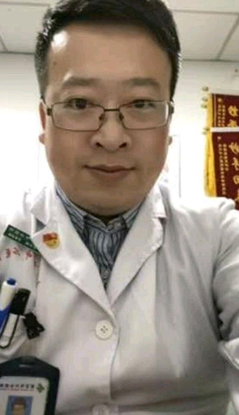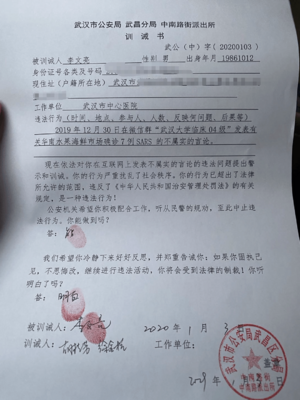Li Wenliang facts for kids
Quick facts for kids
Li Wenliang
|
|
|---|---|
| 李文亮 | |
 |
|
| Born | 12 October 1986 Beizhen, Jinzhou, Liaoning, China
|
| Died | 7 February 2020 (aged 33) Wuhan, Hubei, China
|
| Cause of death | COVID-19 |
| Alma mater | Wuhan University (MMed) |
| Occupation | Ophthalmologist |
| Years active | 2011–2020 |
| Known for | Warning people about COVID-19 before it became a pandemic |
| Spouse(s) | Fu Xuejie(付雪洁) |
| Children | 2 |
| Li Wenliang | |||||||||
|---|---|---|---|---|---|---|---|---|---|
| Chinese | 李文亮 | ||||||||
|
|||||||||
Li Wenliang (Chinese: 李文亮; 12 October 1986 – 7 February 2020) was a brave Chinese eye doctor. He became known for warning his fellow doctors about a new virus in Wuhan, China. This virus later became known as COVID-19.
On December 30, 2019, Li shared a report with his friends. The report talked about several mysterious "pneumonia" cases. He shared this information in a private chat group. He wanted his friends and family to be careful. Even though he asked for privacy, his message spread widely. Because of this, he was called a whistleblower.
The police in Wuhan called him and seven other doctors. On January 3, 2020, they were told off for "making false comments." They were accused of spreading rumors about a new SARS outbreak.
The outbreak was later confirmed to be a new coronavirus, SARS-CoV-2. This virus causes the disease COVID-19. Dr. Li went back to work. Sadly, he caught COVID-19 from a patient. He died from the disease on February 7, 2020, at age 33. Later, Chinese officials apologized to his family. They also took back the warning given to him. In April 2020, he was given a special award by the government.
Contents
Who Was Dr. Li Wenliang?
His Early Life and Education
Li Wenliang was born on October 12, 1986. He grew up in a Manchu family in Beizhen, China. His parents used to work for state-owned companies. He went to Beizhen High School and was a great student.
In 2004, he started studying medicine at Wuhan University School of Medicine. He studied to become a doctor. His teachers said he was a hard-working and honest student. His friends remember him as a big basketball fan.
His Career as an Eye Doctor
After finishing his studies in 2011, Li worked at an eye center in Xiamen for three years. In 2014, he became an eye doctor at Wuhan Central Hospital in Wuhan.
Warning About a New Virus
In late 2019, doctors in Wuhan saw many strange cases of pneumonia. On December 30, 2019, the health department in Wuhan sent a warning. They asked hospitals to investigate the cause of this new pneumonia.
On the same day, Dr. Li saw a patient's report. It showed a high chance of a SARS-like coronavirus. Another doctor, Ai Fen, had found this report. She was worried because her patient had flu-like symptoms that wouldn't go away.
At 5:43 PM, Dr. Li wrote to his medical school friends in a private WeChat group. He said, "7 confirmed cases of SARS were reported from Huanan Seafood Market." He also shared the patient's report and scan. An hour later, he added, "it has been confirmed that they are coronavirus infections." He asked his friends to tell their families to take safety steps. He also asked them to keep the information private.
What Happened After His Warning?
Screenshots of his messages spread online. Soon, his hospital management spoke to him. They blamed him for sharing the information. On January 3, 2020, police questioned Dr. Li. They gave him a formal written warning. They told him he was "publishing untrue statements." He had to sign a paper promising not to do it again. The police warned him that he would be punished if he did it again.
Dr. Li went back to work. On January 8, he caught the virus. On January 31, he shared his experience with the police on social media. His post became very popular. Many people wondered why doctors who gave early warnings were silenced.
On February 4, China's highest court said something important. They said the eight Wuhan citizens should not have been punished. They wrote that what the doctors said was not completely false. The court suggested it might have been good if people had believed the "rumors." They might have started wearing masks and cleaning things.
Dr. Li told a news outlet that he was worried the hospital would punish him. But he felt better after the top court spoke out. He said, "I think there should be more than one voice in a healthy society."
His Battle with the Virus
His Sad Passing
On January 8, 2020, Dr. Li caught COVID-19. He got it while treating a patient at his hospital. The patient had another eye problem but later developed a fever. Dr. Li suspected it was the coronavirus. Two days later, Dr. Li also got a fever and cough. His symptoms quickly became serious.
On January 12, 2020, Dr. Li was taken to intensive care. He was quarantined and treated. He tested positive for the virus on January 30. He was officially diagnosed on February 1. While in the hospital, Dr. Li posted online. He promised to return to work after he got better.
On February 6, Dr. Li's health got worse. Reports said doctors used special equipment to keep him alive. His heartbeat reportedly stopped at 9:30 PM. Chinese state media first reported his death. But then they quickly deleted their posts. Wuhan Central Hospital later said he was in critical condition. They said they were doing their best to save him. The hospital officially announced that Dr. Li died at 2:58 AM on February 7, 2020. During this confusing time, millions of people watched live updates about his condition.
How People Reacted to His Death
By early June 2020, five more doctors from the Wuhan hospital had died from COVID-19. People in Wuhan showed their sadness. They placed flowers and blew whistles at Wuhan Central Hospital. This was a way to honor Dr. Li. Online, people started an activity called "I blew a whistle for Wuhan tonight." They turned off their lights for five minutes. Then, they blew whistles and waved lights outside their windows. Many people left messages on Dr. Li's social media page. They shared their grief and anger.
The World Health Organization (WHO) also shared their sadness. They posted on Twitter that they were "deeply saddened by the passing of Dr Li Wenliang." They added that "we all need to celebrate work that he did."
China's highest anti-corruption group started an investigation. They looked into the issues around Dr. Li's case. A group of Chinese professors wrote an open letter. They asked the government to protect free speech. They also asked for an apology for Dr. Li's death. They said that the virus outbreak was a man-made disaster. They felt China should learn from Dr. Li.
Honored for His Bravery
In April, the Chinese government officially honored Dr. Li as a "martyr." This is the highest honor for a citizen who dies serving China. He was honored along with 13 other doctors who died from COVID-19. Many Chinese internet users have left over 870,000 comments on his last social media post.
In March, a science journal praised Dr. Li. It said his example should inspire doctors to be brave in reporting unusual cases. An Italian author wrote a children's book about Dr. Li. It is called Dr. Li and the crown-wearing virus. It helps teach children about COVID-19. Fortune magazine ranked Dr. Li as the number one "World's 25 Greatest Leaders: Heroes of the pandemic."
His Family Life
When Dr. Li started showing COVID-19 symptoms, he booked a hotel room. He wanted to avoid infecting his family. He was hospitalized on January 12. Even with his care, his parents caught the virus. But they both recovered later.
Dr. Li and his wife, Fu Xuejie, had one son. At the time of his death, they were expecting their second child. In June 2020, his wife gave birth to their second son.
Images for kids
See also
 In Spanish: Li Wenliang para niños
In Spanish: Li Wenliang para niños




